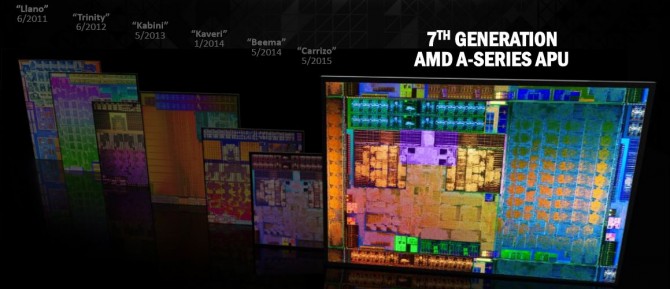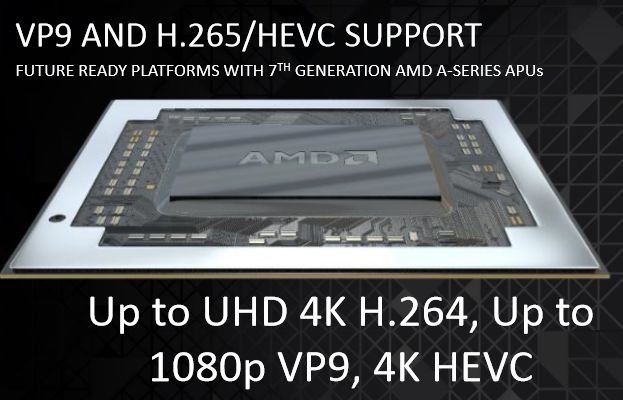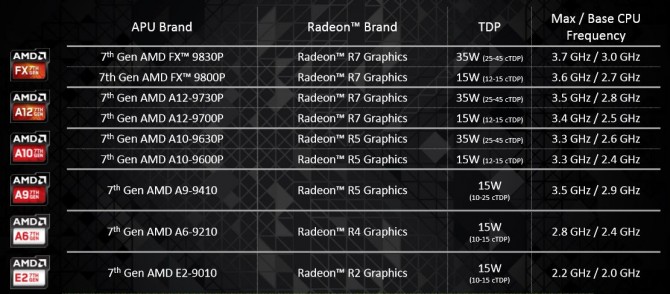AMD 7th Generation Processors: What You Need to Know
Sign up to receive The Snapshot, a free special dispatch from Laptop Mag, in your inbox.
You are now subscribed
Your newsletter sign-up was successful
If you've been shopping for a laptop , you may have noticed that some of the least expensive offerings are powered by AMD chips. Intel's main competitor in the laptop processor market promises better performance and much stronger graphics speeds for the money. Unfortunately, the few AMD-powered laptops we've reviewed in the past year, including the HP EliteBook 745, produced underwhelming results on our tests.
However, AMD could soon be making a push into more mainstream laptops. This week, the company officially took the wraps off of its new 7th Generation APUs (accelerated processing units), which promise huge improvements in performance over its current 6th-gen lineup of chips, particularly for gaming and video. With a couple of SKUs that take on Intel's Core i5 and Core i3 directly, the new "Bristol Ridge" processors could make it easier for budget-conscious consumers to play casual titles at decent frame rates.
Could an AMD APU be in your next laptop? Here are 7 things you need to know about AMD's new 7th-gen processors:
1. More Bang for the Buck: AMD hopes to provide more performance, particularly graphics power, at the same or better prices than its competitor's mid-range or low-end CPUs. For example, according to AMD, the A12 chip compares favorably to Intel's Core i5-6200U, offering 31 percent faster gaming performance as measured by 3DMark 11.
2. Bristol Ridge on the High-End, Stony Ridge for Value: AMD's 7th Generation APUs are divided into two architectures, with different codenames. The faster chips, which are sold under FX, A12 and A10 model numbers, use the Bristol Ridge architecture. The slower A9, A6 and E2 CPUs as based on the "Stony Ridge" platform. Bristol Ridge chips. Both architectures support speedy DDR4 memory, but Bristol Ridge can take RAM that's up to 2400 Mhz while its slower brother tops out at 2133 MHz. The higher-end chips also offer more performance optimizations.
3. Ready for Next-Gen Video: All the A-Series APUs support 4K ultra HD in both the popular H.264 and new-and-improved H.265 encoding formats. They also support Google's VP9 encoding at up to 1080p.
4. Huge Step Up in Speed: AMD says that Bristol Ridge CPUs are 56 percent faster than its 2014 "Kaveri" chips while its Stony Ridge processors are 52 percent faster than their immediate predecessors.
Sign up to receive The Snapshot, a free special dispatch from Laptop Mag, in your inbox.
5. HP Envy x360 Goes First: HP's new Envy x360 2-in-1 will be the first laptop available with an AMD 7th Generation APU. This month, consumers will be able to buy the x360 with either an AMD FX 9800P processor, an Intel Core i5 or an Intel Core i7.
6. 9 New SKUs: The company has announced nine different SKUs for its new processors. The FX, A12 and 10 are all available in both 15-watt (standard laptop) and 35-watt (gaming / workstation) models, while the A9, A6 and E2 are only available with the lower wattage.
The FX and A12 chips both have the fastest GPU, the Radeon R7. The A10 and A9 use the slower Radeon R5, the A6 uses Radeon R4 and the E2 has a Radeon R2.
7. APUs Not CPUs: AMD calls its chips Accelerated Processing Units (APUs), because they feature the company's powerful Radeon graphics processors on the same die as the CPU. Intel also has integrated graphics on its CPUs, but doesn't use the APU terminology.
Bottom Line
For several years now, the vast majority of AMD-powered laptops we've seen have carried price tags well under $600 (usually far less than that). The $749 HP EliteBook 745 with its AMD 6th Gen A12 processor was a noteworthy exception, but suffered from poor battery life and warm temperatures. Since that's the only AMD A12 system we tested, though, we can't say whether the processor was at fault.
AMD's new 7th-generation APUs sound promising on paper, but if the company wants to succeed in the mainstream and at higher prices, it will need to do offer than just strong performance. The chipmaker must convince laptop makers, who have largely been hesitant to put AMD CPUs into their more-expensive laptops, to take a chance on the new platform. HP's Envy x360 is a good first step, but the company needs many more like it.
Laptop Guide
- Laptop Buying Guide: 8 Essential Tips
- The Best & Worst Laptop Brands
- Laptop Tech Support Showdown: Undercover Report
- Should I Buy a Chromebook? Buying Guide and Advice
- Laptops with the Longest Battery Life
- Chromebooks vs. Windows 10 Laptops: What Should You Buy?
- Why You Shouldn't Buy a Touch-Screen Laptop
- Out of the Box Tips: Set Up Your New Laptop Like a Pro
- The Best Time to Buy a Laptop
- Chromebook vs. Tablet: Which Should You Buy?
- Laptop Buying Tips for Students
- 10 Key Features to Look for in Your Laptop
- How to Buy a 2-in-1 Laptop Hybrid
- USB Type-C FAQ: Everything You Need to Know
- How to Get Rid of Your Old Laptop
- Laptop Warranties: What They Cover
- Which CPU is Right For You?
- Which Laptop Features Are Worth the Money?
- Gaming Laptop Buying Guide: Find the Right Rig
- 10 Reasons Why Consumers Should Buy Business Laptops
- Which MacBook is Right for You?
- 5 Things to Look For in Your Next Laptop Keyboard
- How to Configure Your Laptop: Specs That Matter
- Which Graphics Card Do You Need?
- The Perfect Laptop? Here’s What It Should Have
- Why 78 Percent of Laptop Screens Suck
- A Guide to Computer Ports and Adapters
- 13 Ways to Make a Slow Laptop Faster
- How to Tell If You Can Upgrade Your Laptop
- Laptop Locks Guide: Do You Need One?
- 10 Features You Can Skip to Save Money




